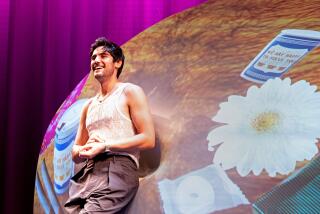Starved for Love
- Share via
Ruth--beautiful, intense, angry--is obsessed with her body, with not eating, with losing weight. Joseph--nice, protective, befuddled--is obsessed with loving, knowing, understanding and possessing Ruth. The ways in which their obsessions at first merge and then collide, and the strengths and limits of obsession itself, are explored in “Eve’s Apple,” Jonathan Rosen’s often compelling but sometimes frustrating first novel.
Ruth and Joseph, recent Columbia University grads in their 20s, live on Manhattan’s Upper West Side. Joseph teaches English to recently arrived Russian immigrants; Ruth goes to her shrink and dabbles in art classes. The only snake in this garden of Eden is Ruth’s increasingly obsessive attitude toward food and her accompanying withdrawal from Joseph.
Not that Ruth’s problems with eating are new to her, or news to Joseph: The formative experience of Ruth’s life was her hospitalization for anorexia when she was 17, and this is the formative experience of the couple’s love affair, too. (In what is hopefully not a new dating ritual among the young, Ruth plays the tape of a crisis-ridden family therapy session for Joseph the night they first make love.) Far from hiding her neuroses, Ruth defiantly and proudly parades “her misery like nudity that has put aside shame,” and Joseph, who fancies himself a healer but is actually in flight from his own sadness, promptly falls in love with her “air of tragedy.” They are the perfect couple: the goddess of grief and the anesthetized young man, the emotional exhibitionist and the emotional pimp, the sad-eyed lady and the savior.
Despite--or because of--Ruth’s constant critical scrutiny of her body, she cannot see what she really looks like. And despite--or because of--Joseph’s constant uncritical scrutiny of Ruth, he cannot see how ill she is. Although she exercises compulsively, makes herself vomit and believes she is a greedy pig--in other words, she carries a large, clear sign that reads “ANOREXIC”--Joseph isn’t quite sure what’s wrong with Ruth or if anything really is. Most important, he cannot tell if there’s something not exactly kosher in the way he fetishizes her “occult sadness” and turns her pain into poetry. “Did I want her to be sick?” Joseph wonders. “Was I in love not with Ruth but her illness? And was it possible that . . . I had actually made her worse?” Is this guy clueless or what?
Joseph’s obliviousness--which, despite his kindness, creates its own form of treachery--is irritating, but that is clearly Rosen’s intent. Where the author fails is in his depiction of Ruth, a girl who “could throw her emotions the way some people can throw their voices.” Unfortunately, it is difficult for the reader to share Joseph’s fascination. It is not just that Ruth is imperious and unkind (in one of the book’s most striking scenes, she fails to notice a crippled man’s attempt to stand up in order to greet her). The problem is that she has no passions other than her body; she has no real relationships outside of Joseph (and she isn’t even overly interested in him); she does not work; she does not, in fact, do too much of anything at all. (Nor does she have even the slightest interest in sex; unlike Scott Spencer’s “Endless Love” or Robert Olen Butler’s “They Whisper,” this novel of a love affair is almost shockingly unerotic.) Ruth is, in short, far less interesting than any young woman, anorexic or not, whom you are likely to know. Perhaps Rosen is consciously attempting to illustrate the fragmented, lopsided quality that perceptions tinged by obsession tend to have or the ways in which anorexia can consume a personality; it is far more likely, though, that he has simply been unable to realize a complex female character.
But Rosen does know how to use language in fresh and lovely ways. He can describe a baby “swathed like a blintz in a white blanket,” or a blank suburban house so unlived in it is “like the clothing of a spy who has torn out all the labels so that he is untraceable,” or the way in which the somewhat aimless Joseph keeps the idea of law school “lodged at the back of my mouth, like a cyanide tablet.” And interestingly--in a book that gives such short shrift to work--the most vividly alive, wonderfully described scenes are the ones that show “Mister Joseph” and his Russian students, with their increasingly garish clothes, their briefcases full of crackers and their lives so enviably “defined by powerful negatives.” Indeed, if Joseph and Ruth could be as tenderly intimate with each other as Rosen is with the English language, the young lovers would have a blissful future in store.
Although “Eve’s Apple” may not fully succeed as a love story, it uses the mystery of self-starvation to explore larger and always interesting questions about knowledge and risk, culture and nature, and the distressing but inescapable fact that “the things that make us human often make us ill.” It is a plea for the acceptance of “negative capability”--that is, the ability to accept uncertainty and doubt as the (dis)organizing principles of life. It is a novel of ideas that centers on the uncomfortable, but probably true, thesis that “most people don’t want to die, but they don’t want to live either.”
And it is no doubt a sign of our times that all these ideas are propounded by an older confidant of Joseph’s, a former therapist who has rejected psychoanalysis but whose wisdom is nevertheless informed by the best insights of that profession. This is, of course, a bit of a cheat--sort of like wanting to have your Freudian cake without having to eat it too.
More to Read
Sign up for our Book Club newsletter
Get the latest news, events and more from the Los Angeles Times Book Club, and help us get L.A. reading and talking.
You may occasionally receive promotional content from the Los Angeles Times.








